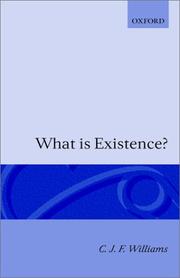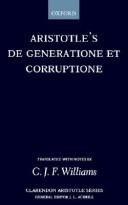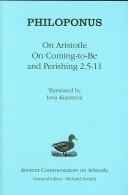| Listing 1 - 3 of 3 |
Sort by
|

ISBN: 0198244290 9780198244295 Year: 1981 Publisher: Oxford: Clarendon,
Abstract | Keywords | Export | Availability | Bookmark
 Loading...
Loading...Choose an application
- Reference Manager
- EndNote
- RefWorks (Direct export to RefWorks)
Metaphysics --- Ontology --- Being --- Philosophy --- Necessity (Philosophy) --- Substance (Philosophy)

ISBN: 0198720629 0198720637 9780198720638 9780198720621 Year: 1982 Publisher: Oxford: Clarendon,
Abstract | Keywords | Export | Availability | Bookmark
 Loading...
Loading...Choose an application
- Reference Manager
- EndNote
- RefWorks (Direct export to RefWorks)
Philosophy of nature --- Aristotle. --- Aristotle --- ROLDUC-SEMI --- #GROL:SEMI-1-05'-04' --- Aristoteles. --- Aristoteles --- Aristote --- Aristotile --- Aristotle - De generatione et corruptione

ISBN: 9781780938776 9780715628546 9781780938691 1780938691 9780715628522 9781472557759 9780715633045 1780938772 071563304X 0715628526 0715628542 1472557751 Year: 2014 Publisher: London: Bloomsbury,
Abstract | Keywords | Export | Availability | Bookmark
 Loading...
Loading...Choose an application
- Reference Manager
- EndNote
- RefWorks (Direct export to RefWorks)
These chapters of Aristotle's treatise are about physical interactions. In his innovative commentary, Philoponus discusses Aristotle's idea that certain qualities of the elements are basic. In what way are they basic? he asks. To what extent can the other qualities be reduced to the basic ones? And if the other qualities depend on the basic ones, how is it that they can vary independently of each other when the basic qualities change? Philoponus develops the idea that the other qualities merely supervene on the basic ones, rather than resulting from them. Moreover, physical qualities admit of different ranges of variation, and so have different thresholds at which they appear or disappear. Philoponus also discusses Aristotle's idea that the elements and their basic qualities survive potentially when mixed together. He explains this by drawing a third sense of 'potential' out of Aristotle's texts to take the place of the two senses which Aristotle explicitly recognises. Philoponus adds further restrictions to Aristotle's principles of causation. Black can contaminate white, but the black in ebony does not have the right matter for affecting the white of milk. He asks why fluids can affect each other more easily than solids. In every case, Philoponus takes Aristotle's discussions further, and his ideas on the dependence of some qualities on others are very relevant to the continuing philosophical debate on the subject.
Aristote, --- Science --- Aristotle. --- De generatione et corruptione (Aristotle). --- Science. --- Aristotle --- Aristote --- Aristotle. - De generatione et corruptione
| Listing 1 - 3 of 3 |
Sort by
|

 Search
Search Feedback
Feedback About UniCat
About UniCat  Help
Help News
News